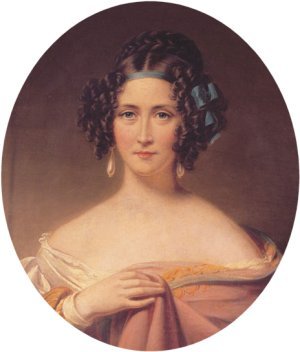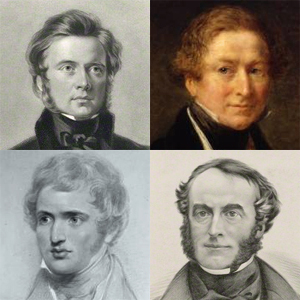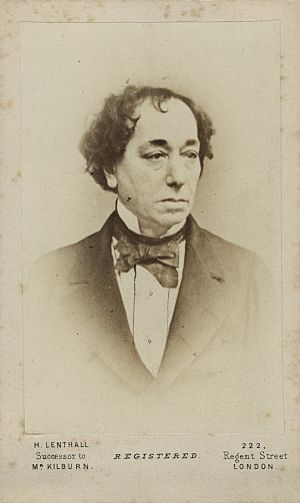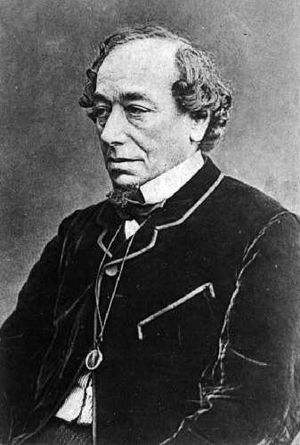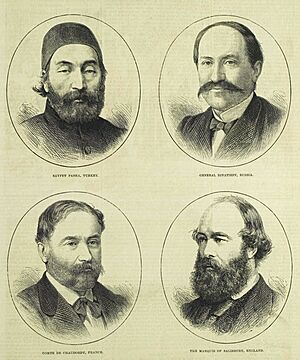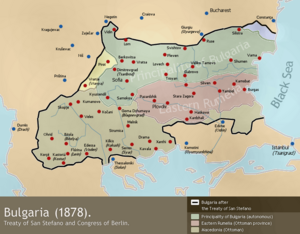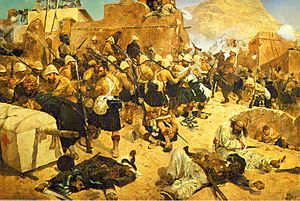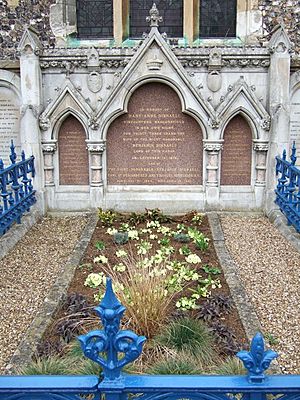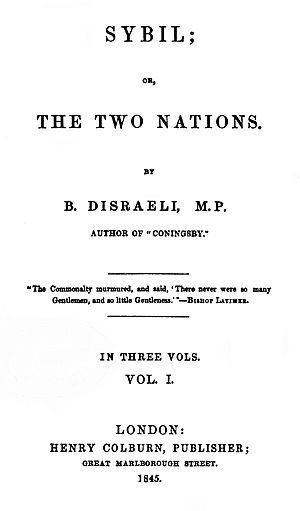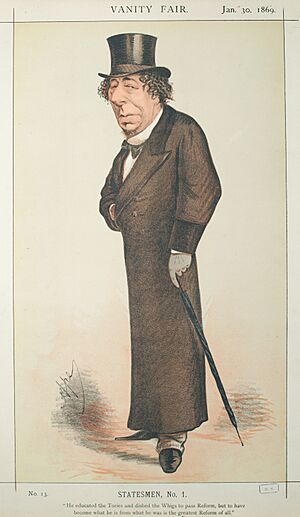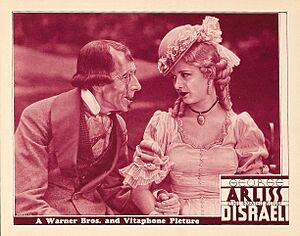Benjamin Disraeli facts for kids
Quick facts for kids
The Earl of Beaconsfield
|
|
|---|---|
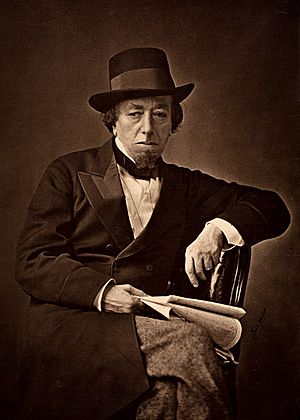
Portrait by Cornelius Jabez Hughes, 1878
|
|
| Prime Minister of the United Kingdom | |
| In office 20 February 1874 – 21 April 1880 |
|
| Monarch | Victoria |
| Preceded by | William Ewart Gladstone |
| Succeeded by | William Ewart Gladstone |
| In office 27 February 1868 – 1 December 1868 |
|
| Monarch | Victoria |
| Preceded by | The Earl of Derby |
| Succeeded by | William Ewart Gladstone |
| Leader of the Opposition | |
| In office 21 April 1880 – 19 April 1881 |
|
| Monarch | Victoria |
| Prime Minister | William Ewart Gladstone |
| Preceded by | Marquess of Hartington |
| Succeeded by | The Marquess of Salisbury |
| In office 1 December 1868 – 17 February 1874 |
|
| Monarch | Victoria |
| Prime Minister | William Ewart Gladstone |
| Preceded by | William Ewart Gladstone |
| Succeeded by | William Ewart Gladstone |
| Chancellor of the Exchequer | |
| In office 6 July 1866 – 29 February 1868 |
|
| Prime Minister | The Earl of Derby |
| Preceded by | William Ewart Gladstone |
| Succeeded by | George Ward Hunt |
| In office 26 February 1858 – 11 June 1859 |
|
| Prime Minister | The Earl of Derby |
| Preceded by | Sir George Cornewall Lewis |
| Succeeded by | William Ewart Gladstone |
| In office 27 February 1852 – 17 December 1852 |
|
| Prime Minister | The Earl of Derby |
| Preceded by | Sir Charles Wood, 3rd Baronet |
| Succeeded by | William Ewart Gladstone |
| Personal details | |
| Born |
Benjamin D'Israeli
21 December 1804 Bloomsbury, Middlesex, England |
| Died | 19 April 1881 (aged 76) Mayfair, London, England |
| Political party | Conservative |
| Spouse | |
| Parents |
|
| Signature | |
| Writing career | |
| Notable works |
List
|
Benjamin Disraeli, 1st Earl of Beaconsfield (born 21 December 1804 – died 19 April 1881) was an important British leader and Conservative politician. He was Prime Minister of the United Kingdom twice. He helped shape the modern Conservative Party and its ideas.
Disraeli is known for his strong voice in world affairs. He had famous political rivalries, especially with Liberal Party leader William Ewart Gladstone. He also promoted "one-nation conservatism" or "Tory democracy." This idea meant that the Conservative Party cared about all parts of society, including the working class. He made the Conservatives the party that strongly supported the British Empire and military action to expand it. These ideas were popular with British voters. He is also the only British prime minister to have been from a Jewish family. He was also a writer and published novels even while he was prime minister.
Disraeli was born in Bloomsbury, England. His father left the Jewish faith after a disagreement. Benjamin became an Anglican (a member of the Church of England) when he was 12. After trying several times, Disraeli became a member of the House of Commons in 1837. In 1846, the prime minister, Sir Robert Peel, divided his party. This happened because he wanted to end the Corn Laws, which were taxes on imported grain. Disraeli strongly disagreed with Peel in Parliament and became a major figure in the party. When Lord Derby, the party leader, formed governments in the 1850s and 1860s, Disraeli served as Chancellor of the Exchequer (in charge of the country's money) and Leader of the House of Commons.
After Lord Derby retired in 1868, Disraeli became prime minister for a short time. He lost the general election that year. He then led the Opposition before guiding his party to win a majority in the 1874 general election. He became good friends with Queen Victoria. In 1876, she made him a lord, giving him the title Earl of Beaconsfield. Disraeli's second time as prime minister focused on the Eastern Question. This was about the weakening Ottoman Empire and other European countries, like Russia, wanting to gain control of its lands. Disraeli arranged for Britain to buy a large share in the Suez Canal Company in Egypt. In 1878, after Russia won battles against the Ottomans, he worked at the Congress of Berlin. He helped achieve peace in the Balkans on terms that favored Britain and were not good for Russia. This diplomatic success made Disraeli one of Europe's most important leaders.
Later, world events turned against the Conservatives. Wars in Afghanistan and South Africa made him less popular. He also upset British farmers by not bringing back the Corn Laws when harvests were bad and cheap grain came from other countries. With Gladstone leading a huge speaking tour, the Liberals defeated Disraeli's Conservatives in the 1880 general election. In his last months, Disraeli led the Conservatives in Opposition.
Disraeli wrote novels throughout his life, starting in 1826. He published his last completed novel, Endymion, shortly before he died at age 76.
Early Life and Entry into Politics
Childhood and Education
Benjamin Disraeli was born on 21 December 1804 in London. He was the second child and oldest son of Isaac D'Israeli, a writer and historian. His family came mostly from Italy and had Sephardic Jewish roots.
When Benjamin was about six, he went to a day school in Islington. Later, he was sent to a boarding school in Blackheath. A big change happened in his family in 1813. After a disagreement with their synagogue, his father decided to leave Judaism. In July and August 1817, Benjamin and his three siblings were baptised into the Church of England. Benjamin was 12 years old when he was baptised.
This change to Christianity was very important for Disraeli. It allowed him to think about a career in politics. At that time, Members of Parliament (MPs) had to take an oath "on the true faith of a Christian." This meant that Jewish people could not become MPs unless they converted.
Early Career and Writing
In November 1821, just before his 17th birthday, Disraeli started working as a clerk for a law firm in London. He later decided he did not want to be a lawyer. He wanted to pursue a career in writing instead.
In 1825, Disraeli got involved in the stock market. There was a boom in shares for South American mining companies. He borrowed money to invest, but the market crashed in late 1825. This caused him to lose a lot of money, and he was in debt for many years.
To earn money, Disraeli turned to writing. His first novel, Vivian Grey, was published anonymously in 1826–27. It sold well but caused some trouble because it seemed to make fun of real people. This hurt his reputation for a while. After these financial and personal setbacks, Disraeli went through a difficult period for about four years.
Travel and Political Beginnings
In 1830–31, Disraeli traveled widely in southern Europe and the Middle East. This trip was very important for him. He learned about different cultures and ideas. These experiences influenced his views on foreign policy later in his career.
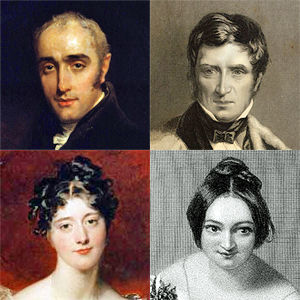
After his travels, Disraeli wrote two more novels. He then turned his attention to politics in 1832. He first tried to become an MP as a Radical candidate in High Wycombe, but he was not successful.
Disraeli's political ideas were a mix of Radical and Tory views. He wanted to reform the voting system but also supported some traditional Tory ideas. He started to spend time with Tory politicians. In 1835, he ran again as a Radical but lost.
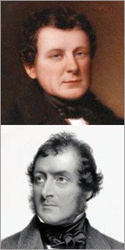
In April 1835, Disraeli ran as a Tory candidate in Taunton. He became known for his strong speeches and arguments. He did not win the election, but his good performance showed that he could be a strong politician. By 1836, Disraeli was firmly part of the Tory party. He was elected to the Carlton Club, a famous Tory club. In June 1837, a new general election was called, and Disraeli was chosen as a Tory candidate.
Parliamentary Career
First Years as an MP
In July 1837, Disraeli won a seat in the House of Commons for Maidstone. He gave his first speech in Parliament on 7 December 1837. It was a difficult start, as he was shouted down by opponents. After this, he kept a lower profile for a while. He generally supported the party leader, Sir Robert Peel.
In 1839, Disraeli married Mary Anne Lewis, who was the widow of a fellow MP. Mary Anne was 12 years older than him and had a good income. While some thought he married for money, they grew to love each other deeply.
In 1841, Disraeli won a seat for Shrewsbury. The election was a big win for the Tories, and Peel became Prime Minister. Disraeli hoped for a government job but was disappointed not to get one. He continued to support Peel's policies.
Disraeli became known for his sympathy towards the Chartist movement, which wanted more rights for working people. He believed that the rich landowners and the working class should work together against the growing power of middle-class business owners. He formed a group called "Young England" with other young Tory MPs. They believed that landowners should use their power to protect the poor.
Disraeli gradually became a strong critic of Peel's government. He often took positions that went against his leader. His most famous disagreements were over the Maynooth Grant in 1845 and the repeal of the Corn Laws in 1846. The Corn Laws put a tax on imported wheat, which made bread expensive. Peel wanted to end these laws to help the poor, especially during the Great Famine in Ireland.
The debate over the Corn Laws split the Conservative Party. Most experienced Tory politicians followed Peel. This left Disraeli as one of the few strong speakers on his side. He became a key figure in the "new" Conservative Party that formed around those who wanted to keep the Corn Laws.
Leader in the Commons
After Peel resigned in 1846, the Tories were divided. The Whig leader, Lord John Russell, became Prime Minister. In the 1847 election, Disraeli successfully ran for the Buckinghamshire area. The Conservatives were led by Lord George Bentinck in the Commons and Lord Stanley in the Lords.
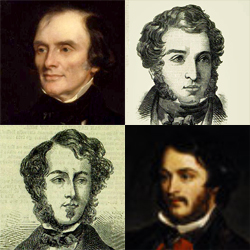
In 1847, a small crisis happened when Lionel de Rothschild, a Jewish man, was elected to Parliament. As a practising Jew, he could not take the required Christian oath. Disraeli supported changing the oath to allow Jews into Parliament. His own party did not like his speech, but he believed in religious tolerance.
Bentinck resigned as leader, and Disraeli's influence grew. He bought Hughenden Manor, a country house, which was important for a Tory leader. He also got financial help from Bentinck's family.
First Time in Government
Chancellor of the Exchequer (1852)
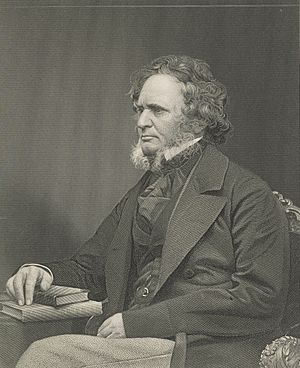
In March 1851, the government fell, and Lord Derby was asked to form a new one. He became Prime Minister, and Disraeli became Chancellor of the Exchequer (in charge of the country's money) and Leader of the House of Commons. Most of the new government members had little experience.
Disraeli's main job was to create a budget. He wanted to lower taxes on things like malt and tea to help working-class people. To balance this, he increased the house tax and continued the income tax. His goal was to make the Conservative Party more appealing to ordinary people.
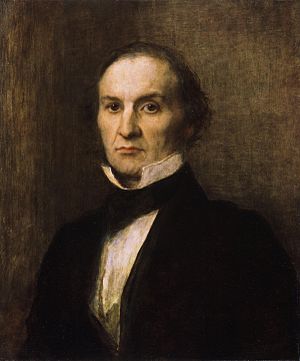
On 16 December 1852, Disraeli gave a long and powerful speech defending his budget. However, William Ewart Gladstone, a rising Liberal politician, gave an angry speech against it. The government was defeated, and Lord Derby resigned. Gladstone became Chancellor in the new government.
In Opposition (1852–1858)
After the government fell, Disraeli and the Conservatives returned to being the Opposition. Disraeli spent most of his long career in Opposition. He opposed the government on major issues.
In 1854, the Crimean War began. Disraeli supported the war. When the British military struggled, Disraeli led the Opposition to defeat the government in 1855. Lord Derby was asked to form a government again but refused. Lord Palmerston became Prime Minister.
When a rebellion broke out in India in 1857, Disraeli was very interested. He had suggested that the British East India Company should no longer rule India. After the rebellion was put down, Palmerston brought in a law for direct rule by the Crown. Disraeli opposed it, but the bill passed easily.
Second Time as Chancellor (1858–1859)
Palmerston's government fell in 1858, and Lord Derby became Prime Minister again. Disraeli once more became Leader of the House of Commons and Chancellor of the Exchequer. This was another minority government, meaning it depended on other parties not uniting against it.
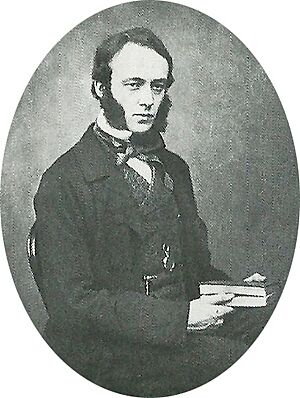
During this time, the government passed the Government of India Act 1858, ending the East India Company's rule. They also passed the Thames Purification Bill, which helped build better sewers for London. Disraeli also helped pass a law allowing Jews to sit in Parliament without taking a Christian oath. In 1858, Baron Lionel de Rothschild became the first Jewish MP.
The Tories tried to pass a Reform Bill in 1859 to slightly increase voting rights. However, the Liberals were uniting, and the government was defeated. Derby resigned, and Palmerston became Prime Minister again.
Opposition and Third Time as Chancellor (1859–1868)
After Derby's government fell, Disraeli faced some criticism within his party. Some blamed him for the defeat. Disraeli led the Opposition, but there was little chance of defeating Palmerston's government.
Palmerston died in 1865, and Russell became Prime Minister. Gladstone became Disraeli's main opponent in the House of Commons. Russell's government tried to pass a new Reform Bill in 1866, but it divided his party. The Conservatives and some Liberals defeated the government. Russell resigned, and Lord Derby formed a third Conservative government, with Disraeli as Chancellor again.
The 1867 Reform Act
Disraeli believed that if more British people could vote, they would support the Conservative Party. He convinced his government to agree to a new Reform Bill. This bill would greatly increase the number of men who could vote. It was a bold move, as the Liberals were supposed to be the champions of reform.
The Reform Act 1867 passed in August. It gave the right to vote to many more men, including male householders and lodgers who paid at least £10 for rooms. It also removed some "rotten boroughs" (areas with very few voters but still an MP) and gave new seats to growing towns like Liverpool and Manchester. Disraeli was praised for his "marvellous parliamentary skill" in getting the bill passed.
First Term as Prime Minister (1868)
Lord Derby's health was failing, and he resigned in February 1868. He recommended Disraeli to Queen Victoria as his successor. Disraeli became Prime Minister for the first time. He famously said, "I have climbed to the top of the greasy pole."
Short Government and 1868 Election
The Conservatives were still a minority in Parliament. A new election was needed after the Reform Bill changed the voting rules. Disraeli's first time as Prime Minister was short. He made few major changes in his government.
His government faced a big debate over the Church of Ireland. This church was the official church in Ireland, even though most Irish people were Catholic. Gladstone proposed to end the Church of Ireland's official status. This united the Liberals and caused problems for the Conservatives.
Disraeli's government stayed in office until the December general election. The Liberals won a large majority, and Disraeli resigned.
During his short time as Prime Minister, Disraeli's government passed some important laws. They ended public executions and helped stop bribery in elections. They also allowed the Post Office to buy telegraph companies, which was an early form of nationalisation. He also sent a successful military expedition to Ethiopia.
Back in Opposition and Return to Power
Opposition Leader (1868–1874)
With Gladstone's Liberal Party in power, Disraeli had little power to stop their laws. He decided to wait for the Liberals to make mistakes. He also wrote a new novel, Lothair (1870), which became a bestseller.
By 1872, some Conservatives were unhappy that Disraeli wasn't challenging Gladstone more. But then, problems started to appear within the Liberal Party. Disraeli began to assert his leadership. He gave a famous speech in Manchester, comparing the Liberal leaders to "exhausted volcanoes."
Disraeli's wife, Mary Anne, died in December 1872. She had been ill with stomach cancer. She famously said, "You know Dizzy is my J.C." (meaning Jesus Christ), showing her deep devotion to him.
In 1873, Gladstone's government was defeated over a bill about a Catholic university in Dublin. Gladstone resigned, and Queen Victoria asked Disraeli to form a government. Disraeli refused. He knew that without a new election, his government would be a minority. He wanted a strong majority. Gladstone's government continued to struggle.
1874 General Election
In January 1874, Gladstone called a general election. He thought if he waited longer, his party would do even worse. Disraeli focused his campaign on criticizing the Liberal government's actions over the past five years.
As the votes were counted, it became clear that the Conservatives had won a majority. This was their first majority since 1841. They won 350 seats to the Liberals' 245. Queen Victoria asked Disraeli to be Prime Minister for the second time.
Second Term as Prime Minister (1874–1880)
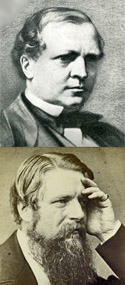
Disraeli's new government had 12 cabinet members. Lord Salisbury became Secretary of State for India. Lord Derby became Foreign Secretary, and Sir Stafford Northcote became Chancellor.
In August 1876, Disraeli was made a lord, becoming the Earl of Beaconsfield and Viscount Hughenden. Queen Victoria had offered him a peerage before, but he had declined. His health was not good, and he found the House of Lords, with its less intense debates, a better place for him. He told a friend, "I am dead; dead but in the Elysian fields."
Domestic Policy and Reforms
Disraeli's government passed many reforms under the leadership of Richard Assheton Cross, the Home Secretary. These included:
- The Artisans' and Labourers' Dwellings Improvement Act 1875: This law provided loans for towns and cities to build affordable housing for working-class people.
- The Public Health Act 1875: This law updated health and sanitation rules across the country.
- The Sale of Food and Drugs Act (1875): This helped ensure food and medicine were safe.
- The Education Act (1876): This improved education.
Disraeli's government also introduced new laws to protect workers. These included the Conspiracy, and Protection of Property Act 1875, which allowed peaceful picketing by workers. The Employers and Workmen Act (1875) allowed workers to sue employers if they broke contracts. Because of these social reforms, a Liberal-Labour MP said in 1879 that "The Conservative party have done more for the working classes in five years than the Liberals have in fifty."
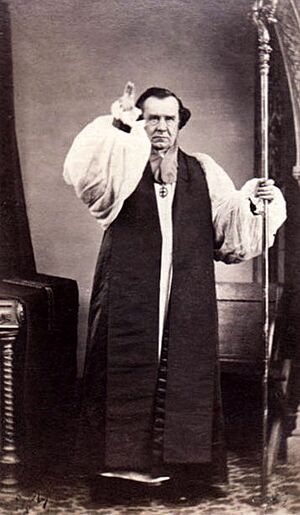
Disraeli also used his power to appoint people to government jobs. He often chose Conservatives who needed help, even creating new positions for them. He also rewarded friends with church positions.
Foreign Policy and the Empire
Disraeli always thought foreign affairs were the most important part of being a leader. He wanted to make Britain's place in Europe stronger.
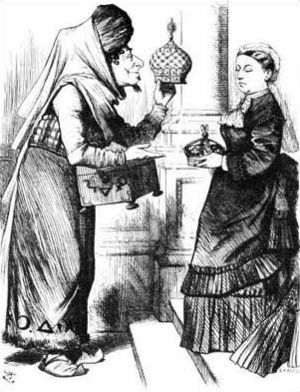
The Suez Canal, opened in 1869, made sea travel between Britain and India much shorter. By 1875, about 80% of the ships using the canal were British. The canal was built by French companies, but the ruler of Egypt, Isma'il Pasha, owned 44% of the shares. He was known for spending too much money.
In November 1875, Disraeli learned that the Egyptian ruler wanted to sell his shares in the Suez Canal Company to a French company. Disraeli quickly decided to buy the shares for Britain. He borrowed the money from a banker, Lionel de Rothschild. The deal was completed on 25 November.
Disraeli told the Queen, "it is settled; you have it, madam!" The public loved this bold move. It showed Britain's power around the world. The Suez Canal became very important for British foreign policy, especially for protecting the route to India.
Queen Victoria as Empress of India
Queen Victoria had long wanted an imperial title. She was annoyed that other European rulers, like the Russian Tsar, had higher titles than her. She wanted to show Britain's growing importance in the world. She wanted the title "Empress of India" to be made official.
Disraeli agreed to introduce a bill for this. He faced opposition from some politicians, but he argued strongly for it. The Royal Titles Act 1876 was passed. After this, Victoria began signing her letters "Victoria R & I" (meaning Queen and Empress).
The Eastern Question and the Congress of Berlin
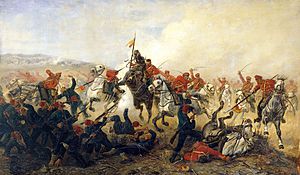
In 1875, people in Bosnia and Herzegovina, which were part of the Ottoman Empire, rebelled against Turkish rule. The Turks put down a similar uprising in Bulgaria very harshly. When news of these terrible actions spread, Gladstone spoke out strongly against the Turks. Disraeli, however, wanted to keep the Ottoman Empire strong to prevent Russia from gaining too much power in the region.
In April 1877, Russia invaded Turkey, starting the Russo-Turkish War. The Russians advanced quickly. This worried the British, who feared Russia would take Constantinople. Disraeli warned that Russia was a threat to British interests. Many Britons supported Disraeli's strong stance.
After Russia won, they signed the Treaty of San Stefano in March 1878. This created a large Bulgarian state that would be controlled by Russia. Britain found this unacceptable. German Chancellor Otto von Bismarck suggested an international conference in Berlin to discuss the peace terms.
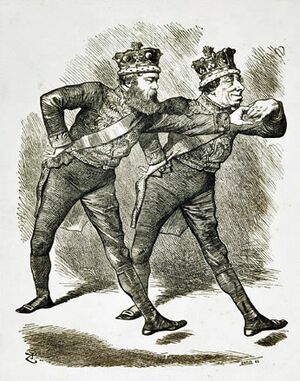
The Congress of Berlin was held in June and July 1878. Disraeli and Salisbury represented Britain. Disraeli worked to prevent a large, Russian-controlled Bulgaria. To balance Russia's gains, Britain secretly arranged with the Ottomans to take control of Cyprus. This deal was announced during the Congress and made Disraeli very popular.
The Treaty of Berlin was signed on 13 July 1878. Disraeli and Salisbury returned home as heroes. Disraeli famously said, "Lord Salisbury and I have brought you back peace—but a peace I hope with honour."
Wars in Afghanistan and South Africa
Britain wanted to keep Russia out of Afghanistan to protect India. In 1878, Russia sent a mission to Kabul. Britain then sent its own mission, leading to the Second Anglo-Afghan War. British forces easily defeated the Afghans.
In South Africa, Britain wanted to unite its colonies with the Boer republics. The governor of Cape Colony, Sir Bartle Frere, made demands on the Zulu king, Cetewayo, which led to war. In January 1879, the Zulus attacked a British camp in the Battle of Isandlwana, killing over a thousand British soldiers. Disraeli was shocked but sent more troops. The Zulus were defeated in July 1879.
Final Years and Legacy
1880 Election and Death
Gladstone began a huge speaking tour in 1879, attacking Disraeli's government. Bad weather and poor harvests also hurt the Conservatives' support among farmers. Disraeli's health was also failing.
In March 1880, Disraeli's government decided to call a general election. Disraeli did not campaign publicly because he was a lord. The Conservatives were decisively defeated. The Liberals won a clear majority. Disraeli resigned as Prime Minister on 21 April 1880.
Returning home, Disraeli finished his last novel, Endymion. He continued to serve as the Conservative leader in the House of Lords. His health worsened in March 1881. Benjamin Disraeli died on 19 April 1881, at the age of 76. His last words were "I had rather live but I am not afraid to die."
Queen Victoria offered him a state funeral, but his family chose a private burial. He is buried with his wife at St Michael and All Angels Church on the grounds of his home, Hughenden Manor. Queen Victoria sent primroses, his favorite flowers, to the funeral and visited his tomb. There is also a memorial to him in Westminster Abbey.
Political Legacy
Disraeli's ideas greatly influenced the Conservative Party. He promoted "One Nation" views, suggesting that the Conservatives cared about all people, including the working classes. He believed in improving the lives of urban workers.
He also strongly supported the British Empire. Before him, imperialism was more of a Liberal idea. Disraeli made the Conservatives the party that loudly supported the Empire and military action to protect it. This helped the Conservatives gain support from working-class voters.
Historians still debate whether Disraeli truly believed all his political ideas or if he adopted them to gain power. However, many agree that his ideas were consistent and important for shaping British politics. He helped Britain move towards the 20th century, passing major Reform Acts and giving the Queen a new symbolic role. He also brought Britain more into European affairs.
Role of Jewish Heritage
Disraeli was a Christian, but he came from a Jewish family. He used his Jewish background to claim a connection to an ancient, noble heritage. At the time, Jewish people were gaining more rights in England. By 1858, Jewish people could sit in Parliament. Disraeli, having been baptised, was already an MP.
In Popular Culture
Disraeli was a very popular figure in Victorian Britain. He was often shown in cartoons and plays. Even after his death, he remained a popular hero in British music halls, which were like variety shows.
He has been portrayed in many films and TV shows. Actor George Arliss won an Oscar for playing Disraeli in the 1929 film Disraeli. Other actors who have played him include John Gielgud in The Prime Minister (1941) and Alec Guinness in The Mudlark (1950). Ian McShane starred in the 1978 TV miniseries Disraeli: Portrait of a Romantic. These portrayals often showed him as a kind and wise leader.
Works by Disraeli
Novels
- Vivian Grey (1826)
- Popanilla (1828)
- The Young Duke (1831)
- Contarini Fleming (1832)
- Ixion in Heaven (1832/3)
- The Wondrous Tale of Alroy (1833)
- The Rise of Iskander (1833)
- The Infernal Marriage (1834)
- A Year at Hartlebury, or The Election (with Sarah Disraeli, 1834)
- Henrietta Temple (1837)
- Venetia (1837)
- Coningsby, or the New Generation (1844)
- Sybil, or The Two Nations (1845)
- Tancred, or the New Crusade (1847)
- Lothair (1870)
- Endymion (1880)
- Falconet (unfinished 1881)
Poetry
- The Revolutionary Epick (1834)
Drama
- The Tragedy of Count Alarcos (1839)
Non-fiction
- An Inquiry into the Plans, Progress, and Policy of the American Mining Companies (1825)
- Lawyers and Legislators: or, Notes, on the American Mining Companies (1825)
- The present state of Mexico (1825)
- England and France, or a Cure for the Ministerial Gallomania (1832)
- What Is He? (1833)
- The Vindication of the English Constitution (1835)
- The Letters of Runnymede (1836)
- Lord George Bentinck (1852)
Images for kids
See also
 In Spanish: Benjamin Disraeli para niños
In Spanish: Benjamin Disraeli para niños
 | Valerie Thomas |
 | Frederick McKinley Jones |
 | George Edward Alcorn Jr. |
 | Thomas Mensah |



